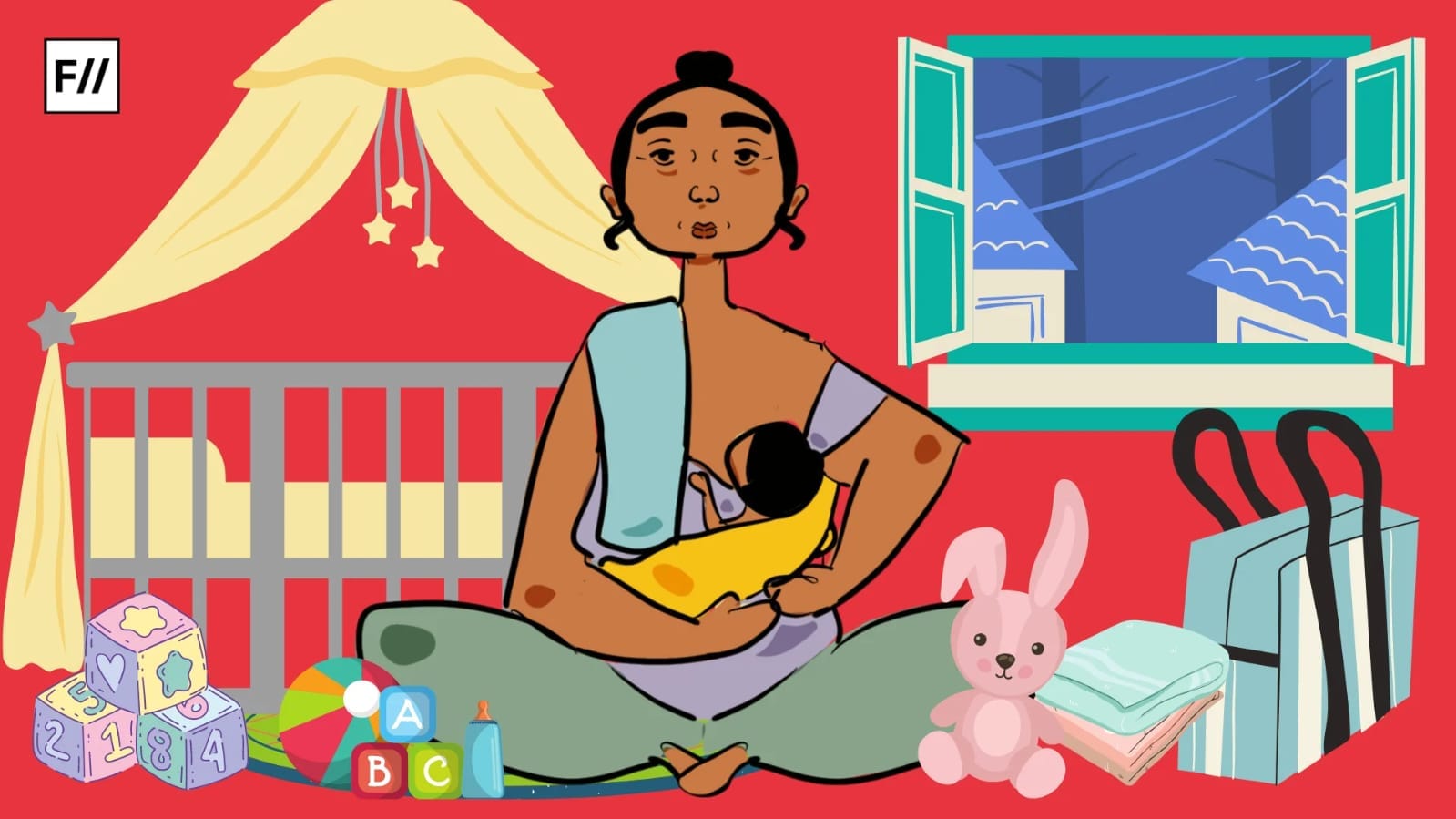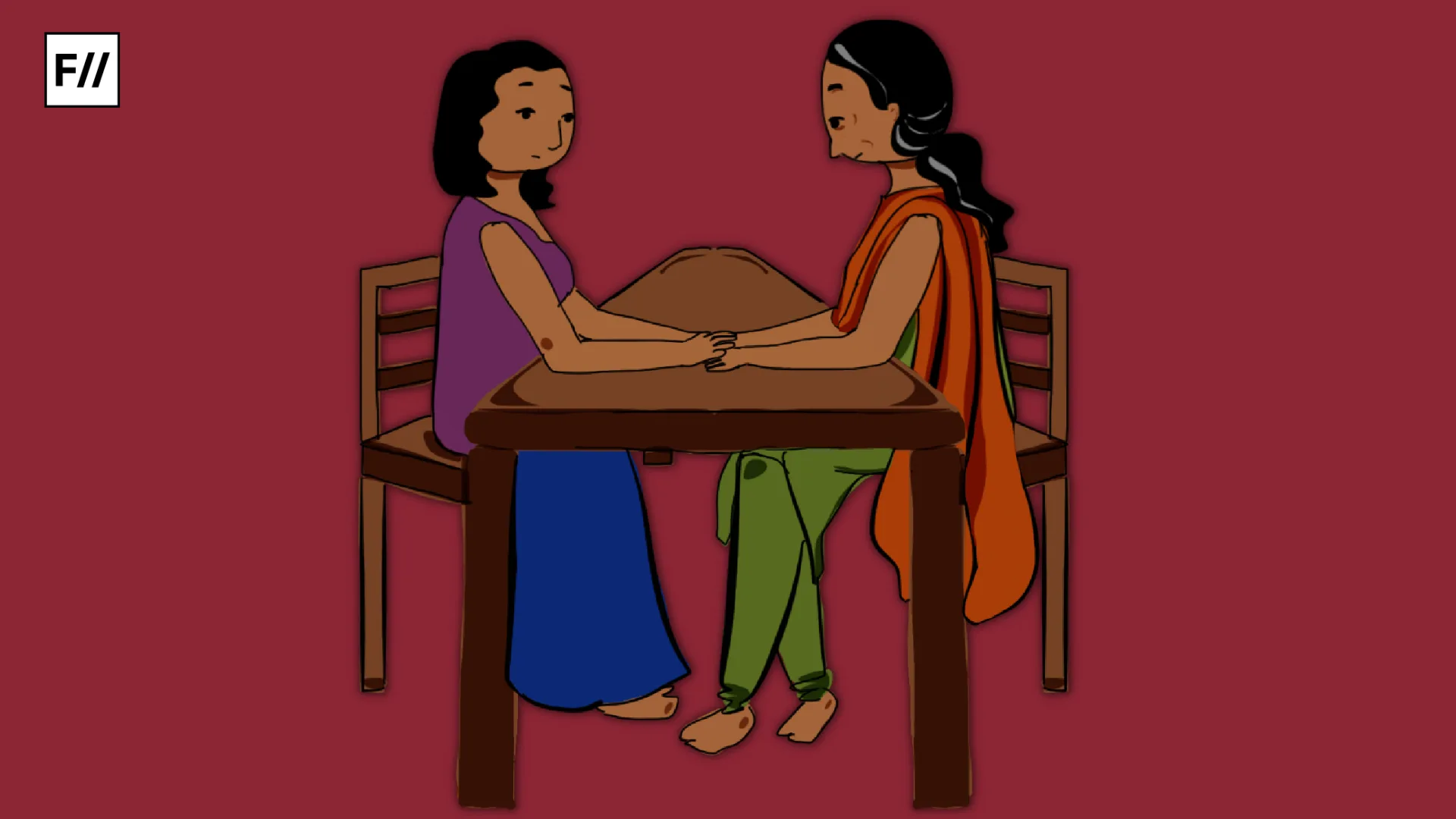Every morning she woke up earlier than the rest of the household could, packing dabbas (tiffins), school bags, and neatly ironing uniforms; all to make sure that no one had any difficulty in how the day progressed. She was vigilant. Dutiful. Obedient. She was not being, but was only doing.
Each morning in motion, without a voice, without a pause, without a complaint. Isn’t this a story of most mothers in India, celebrated for their sacrificial nature? But what really happens to her when her personhood is only reduced to being a mother, who only gives but not gets?
Long before a mother is born, the idea of motherhood is deeply entrenched in her – often in her girlhood – through stories, myths and fables, worshipped goddesses, play, and rituals which are passed on from generations. In India, the course of motherhood is not just viewed as personal or familial transformation, but is rather seen as a conformance to the cultural scripts, deeply rooted in a heteronormative, patriarchal set up.
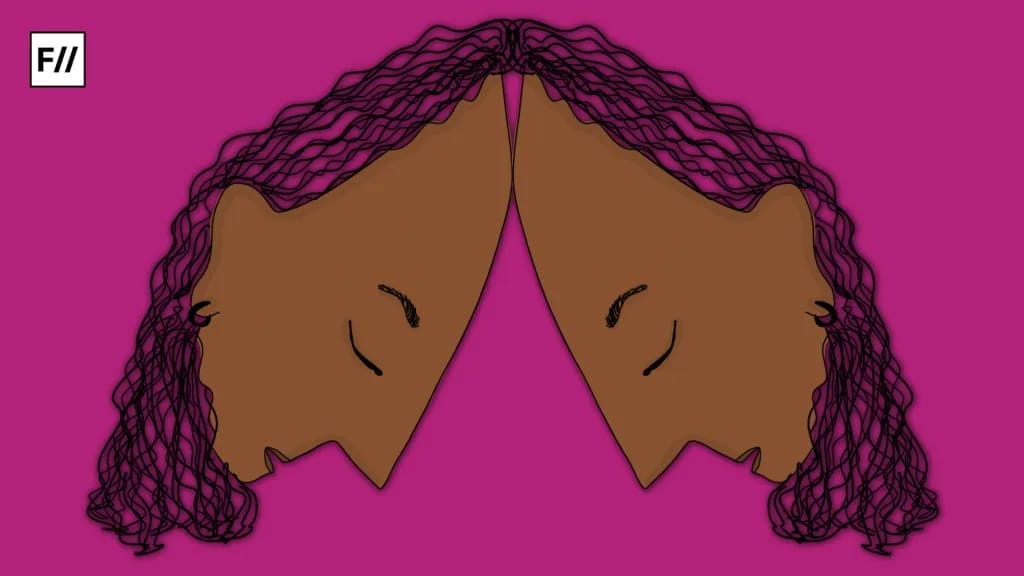
Adreinne Rich, in her 1976 book Of Woman Born: Motherhood as Experience and Institution defined this maternal experience of an oppressive and patriarchal institution that is controlled and defined by men as ‘motherhood’, and distinguished it with ‘mothering’ – a potentially empowering, female centric and defined experience of becoming a mother.
It is between this space of motherhood and mothering, that we raise the question of what happens to the identity of a mother in a society that has already defined her? Do we celebrate the erasure of her selfhood, under the pretense of a virtuous and self-sacrificial mother who devotes her entire life to the lives of others? Do we only celebrate her life if she lives by the societal blueprint provided to her?
When motherhood is glorified and idealised to such standards, we silence not just her voice but also her inner world – her selfhood, desires, longing, ambivalence, and exhaustion. In doing so, we lose the personhood of the mother. To explore this erasure of personhood, and its emotional, cultural and systemic realms, we suggest adopting an intersectional feminist and psychoanalytic lens to delve into the inner world of Indian motherhood, to question the dominant narratives and introduce the realms of matricentric feminism and motherhood.
Realities of Indian motherhood
In India mothers are worshipped in abstract ways. They hold a revered status in the society, where their role goes far beyond simply raising children. They are the embodiment of purity, love and sacrifice, and are the cornerstones of family traditions and nurturance. To uphold these values and ideas, they are often compared to goddesses, and epics. The stories of Sita, Durga, Lakshmi and Parvati, being some of the most common comparisons in every household, intricately tie together the idea of an ‘ideal’ mother.
The stories of Sita, Durga, Lakshmi and Parvati, being some of the most common comparisons in every household, intricately tie together the idea of an ‘ideal’ mother.
Each carries layers of obedience, protection, selflessness, self-sacrificing nature with unwavering strength, that come together to create the image of a rather restrictive archetype – one that leaves little room for ambivalence, exhaustion, anger, or desires, all of which shape the idea of an ‘im-perfect‘ mother.
The sociocultural glorification and idealisation of motherhood rarely uplifts them, instead it begins to control them. Like a hawk in the sky, they watch – they survey, monitor, judge and then prey on any action that does not fit their prescribed discourses. In the name of celebration, mothers are controlled, and silenced, using the gold standard behaviour set by the society. What looks like reverence, is often disguised as erasure to strip away her agency; where her humanity is denied, and her divinity welcomed.
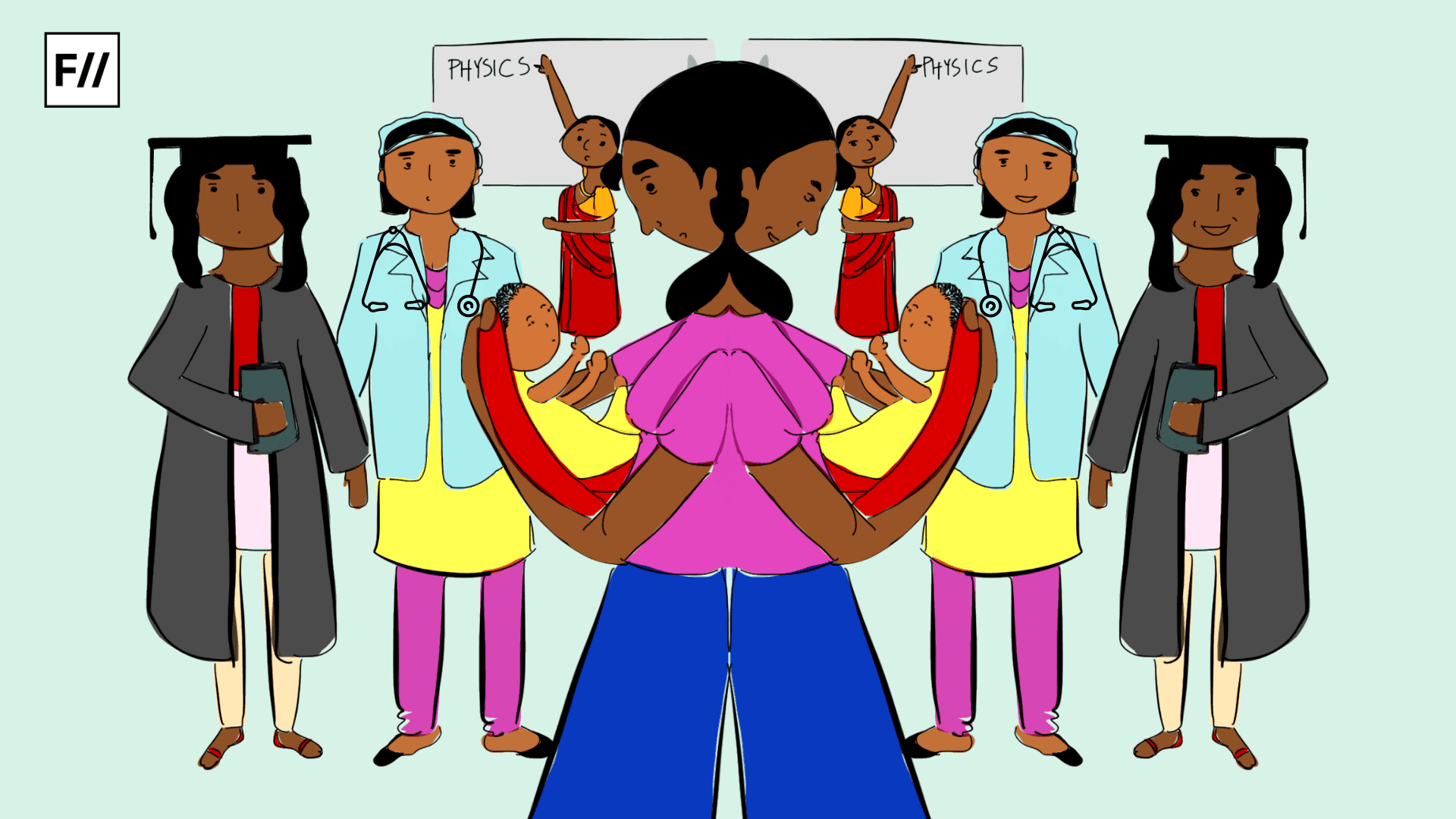
This glorification romanticises motherhood to the extent of obscuring the weight of caregiving. Her love for her children and family becomes undistinguished from her acts of service, making her unpaid labour invisible. This invisibility becomes her strongest suit, reducing her to being desireless, selfless, and dependent. It is not accidental, but rather a demand placed on her by the society, where she becomes defined only by the presence, or the lack of it, of herself in other’s lives. Thus, making us question what is the emotional burden she carries with herself, and is it really hers (alone) to carry?
Perils of glorification of motherhood: culturally worshipped or chained?
Everytime a mother feels exhausted, angry, frustrated, and the many emotions that are contradictory to being an ‘ideal’ mother – she silences her plea for help by telling herself, ‘I shouldn’t feel this way‘. She rejects this feeling, in a similar manner the society rejects it for her.
This inner experience of the rules placed on herself, are a mirror of the sociocultural expectations that are placed on her. She denies herself the help that society and culture has already denied her, so that she is not deemed as unfit.
This births the cycle of shame, guilt and betrayal that is difficult to break free from. These expectations don’t begin with motherhood. They are internalised from a young age, when she is encouraged to play ‘ghar ghar‘ with her friends, to the time she is asked to balance her studies and household chores. She absorbs the unsaid and makes it a part of her psyche. Ime
Malala in a (2018) article, spoke about her experience with the burden of motherhood, ‘Do not even get me started on the superhuman powers that are supposed to come with motherhood. Have a healthy happy baby who never cries (how is that even possible?!). Have a sparkling house because even the slightest of dirt can harm your child and also you are a mother now, you need to get your act right. Be super cute always, if you drop the ball, your significant other will stray. How about time to focus on me? Can I take a moment to just not be ok, to be overwhelmed? Well maybe on your free time, which if you go by the expectation is essentially never.‘
So what is the cost of this absorption? A disconnection from the self, a loss of desires, a new identity that seems unfamiliar, suppression of her needs and feelings, and an invisibility of herself, in her own eyes, and of others. This psychological burden that many mothers carry, was echoed in what the feminist author, Sharon Hays calls, ‘intensive mothering‘ (1996).
This psychological burden that many mothers carry, was echoed in what the feminist author, Sharon Hays calls, ‘intensive mothering‘ (1996).
She writes, ‘Intensive mothering ideology mandates that mothers be the primary, if not exclusive, of children, and that mothering must be child-centered, expert-guided, emotionally absorbing, labor-intensive, and financially expensive. Moreover, it positions women in an all-caring, self-sacrificing ideal “Mother”, with limited and constrained agency in the public, and professional realm‘.
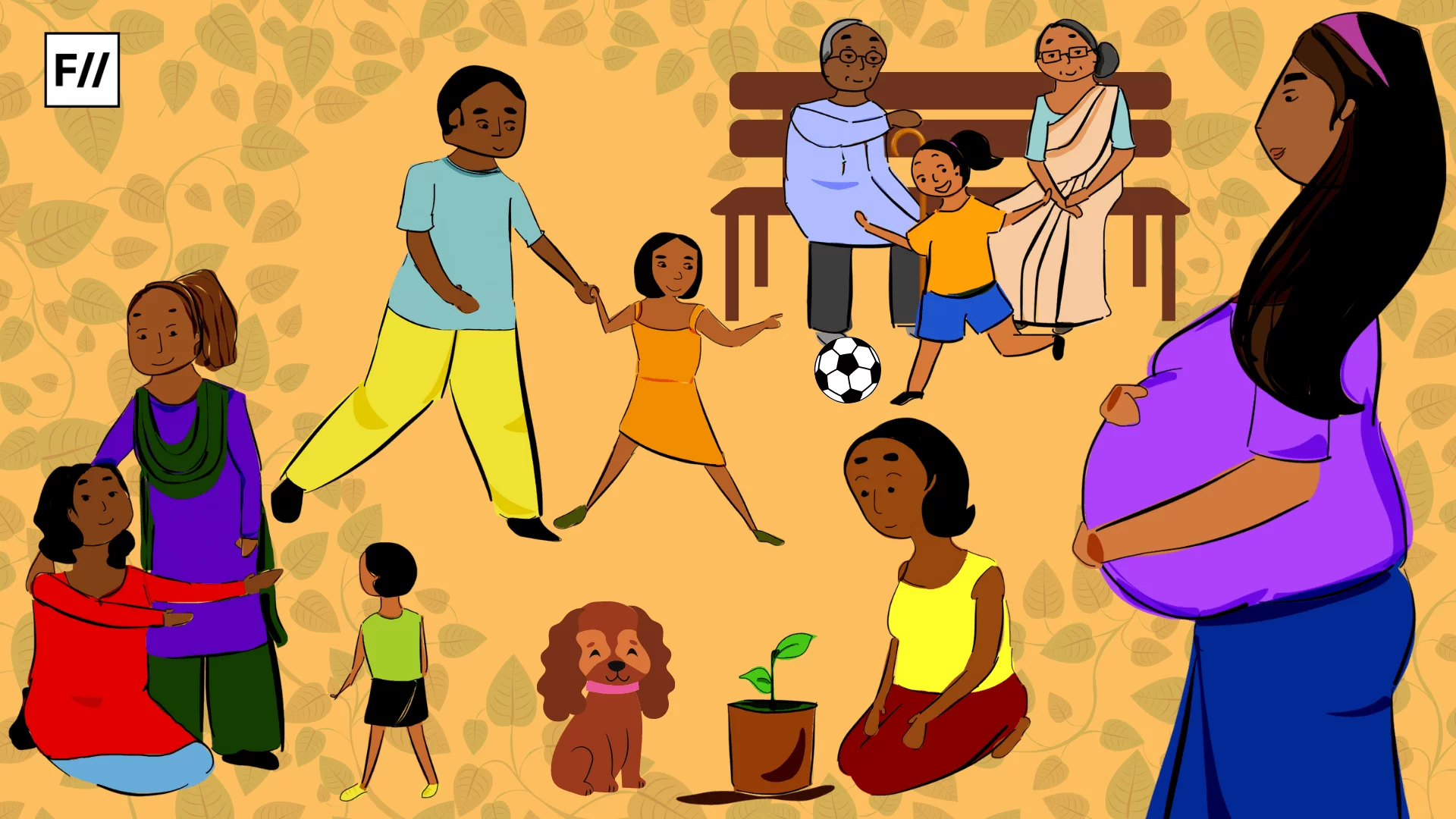
It indicates that it is not an individual burden to carry, but rather a societal and cultural script that requires mothers to completely devote their time, energy and life to their children. Their total devotion is rewarded by extremely high standards that are often unmet. Thus, creating a split between the ideal mother and the real mother.
Reclaiming the woman in the mother: matricentric feminism
The story we began with is not an individual account, it is a collective experience of many Indian mothers, whose identities are shadowed by this dominant discourse. It is a narrow construction like a motherhood manual with rigid dos and don’ts. Where her capability of being a mother is judged according to these strong ideals, leaving little room for complexities. But what happens, if a mother chooses to not conform to these ideals?
What happens to her if she chooses to be more than a mother, more than a caregiver, a full, functional and complex human being? It is in these cracks of an ideal mother, where we can allow her humanity to seep in and complexities to arise. This was echoed by Dr. Andrea O’Reilly in 2019, when she introduced Matricentric Feminism as, ‘the unfinished business of feminism by positioning mothers’ needs and concerns as the starting point for a theory and politics on and for women’s empowerment.‘ Thereby, allowing a woman to define what it means to be a mother on her own.
What if we dared to reimagine the opening story through this lens? Where, she is not just doing, but being. Although she still wakes early, she is learning to take pauses. She is learning to rest and breathe. She is making space for her anger and desire, instead of going in a shame spiral.
Although she still wakes early, she is learning to take pauses. She is learning to rest and breathe. She is making space for her anger and desire, instead of going in a shame spiral.
She is voicing her wants and needs. Thus, learning to live for herself.
Reimagining motherhood would mean to embrace these small radical changes. To unlearn the cultural scripts, and reclaim the idea of motherhood – as an emergence, rather than a fixed idea. It is to make space for differences and complexities.
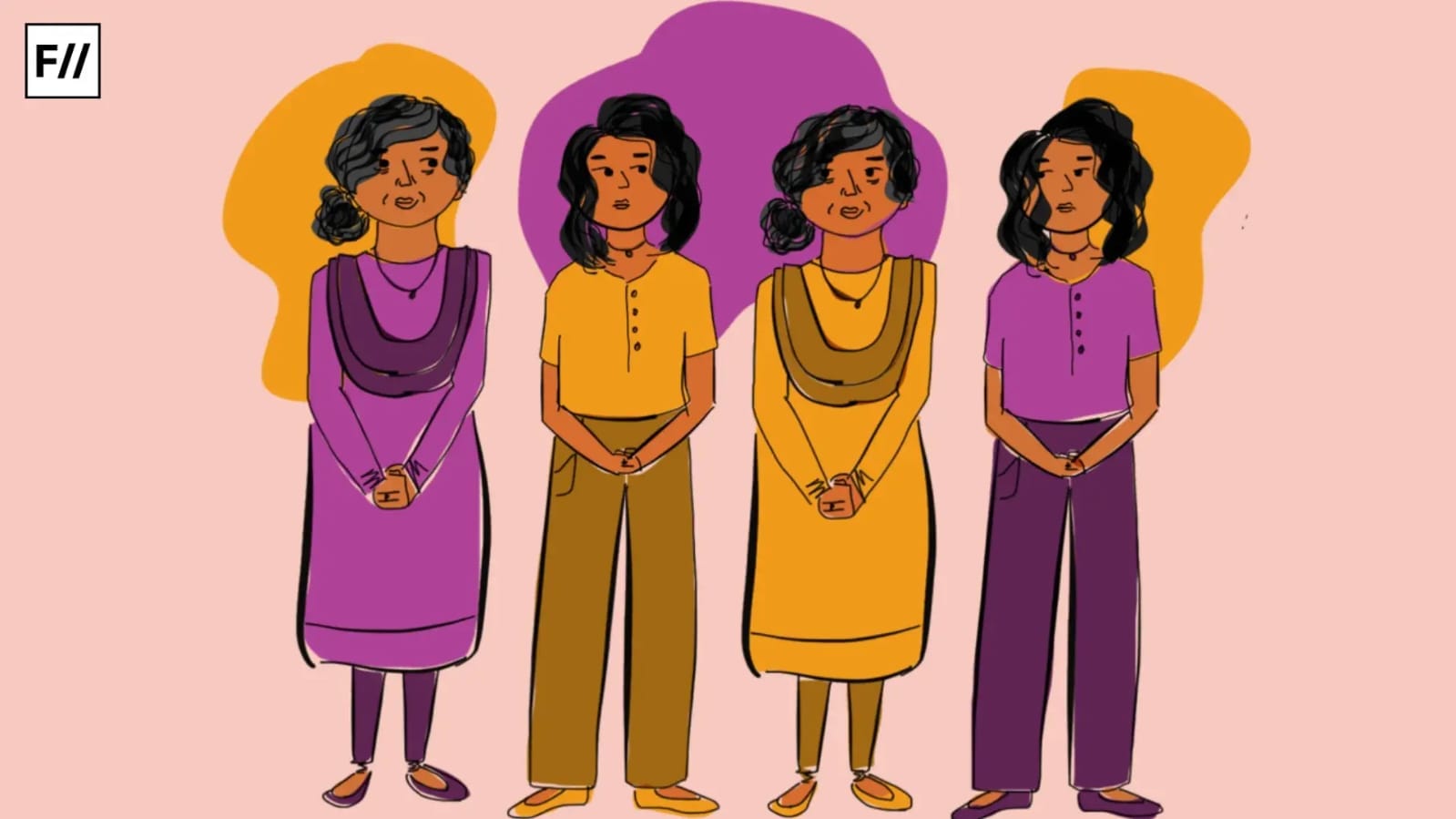
As Dr. O’Reilly said, ‘is not about choosing blue over pink, or trucks over dolls but about living, to use the title of Marilyn Waring’s work, ‘as if women counted’‘. Hence, it is time to echo their stories in their voices and script an agentic realm of motherhood.
References:
Hays, S. (1996). The cultural contradictions of motherhood.
Malala, I. (2018, February 2). The burden on motherhood – Ime Malala – Medium. Medium. https://medium.com/@imemalala/the-burden-on-motherhood-fd4ad158a27b
O’Reilly, A. (2009). That is what Feminism Is—The acting and living and not just the told”: modeling and mentoring feminism. In Feminist Mothering (pp. 191–202). State University of New York Press. https://doi.org/10.2307/jj.18255255.15
O’Reilly, A. (2019). Matricentric Feminism: A Feminism for Mothers. Journal of the Motherhood Initiative for Research and Community Involvement, 10(1–2).
https://jarm.journals.yorku.ca/index.php/jarm/article/view/40551
Rich, A. (1976). Of Woman Born: Motherhood as experience and institution. W. W. Norton & Company.
About the author(s)
Dr Ketoki Mazumdar is an Assistant Professor of Psychology at FLAME University, Pune. She also maintains a keen research interest, mainly along the lines of gender and mental health, maternal mental health, parenting journeys, social isolation and loneliness, and work-family interface. She has extensively published in recognised and peer-reviewed journals. Dr Mazumdar is also a trained psychotherapist and works with individuals, couples and families in their life journeys. Her clinical work is oriented towards feminist, relational, and somatic therapies, with a particular emphasis on the embodiment of trauma. Dr Mazumdar has received several prestigious grants and awards, including the SPSSI APA Div 9 RGS Grant, AHI Maynooth University Fellowship, the IACCP Conference Award (2023), and the Tata Institute of Social Sciences Research Council Fund (2020). She has also been recognised with a full BIPOC scholarship for the PostPartum Support International 2021 Annual Conference and the International Marcé Mentorship Program for 2021-2022 and 2023-2024. Her commitment to ethical research and sensitivity to multiculturalism at the intersection of personal issues and social justice is a continuous process she engages in, which further enhances her meaningful contributions to the field of psychology.
